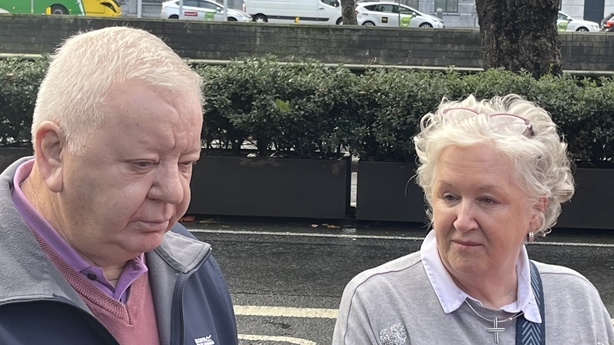A High Court judge has ruled that lawyers for An Garda Síochána and the Minister for Justice must appear in court next month to explain why relatives of some of the victims of the 1974 Dublin and Monaghan bombings should not be granted leave to take legal action against them.
The relatives are seeking to force the State to disclose intelligence material about the attacks in which 34 people were killed.
More than half a century after the bombings, relatives of some of the victims and survivors went to the High Court in Dublin as part of their quest for answers about what happened.
Their lawyers are seeking a court order to compel the Department of Justice and An Garda Síochána to provide intelligence documents about the attacks to an inquiry by Northern Ireland's Police Ombudsman.
That inquiry is investigating allegations of collusion between members of the RUC and British Army with a a loyalist gang believed to have been responsible.
No one has ever been convicted in connection with the bombings and relatives of those killed believe the perpetrators may have been protected from prosecution because members of the British security forces were involved.
Garda intelligence material about the attacks has been provided to an independent police investigation into the alleged activities of the Glenanne Gang, but not to the Police Ombudsman, whose report is expected to be next year.
In May this year the officer in charge of that independent police investigation, Iain Livingstone, told RTÉ Prime Time that he has no doubt there was collusion.
"It’s disgraceful that they have to come to this court to seek access to these files, for access to information that is long, long overdue," said solicitor Kevin Winters of Belfast legal firm KRW Law.
"We want the files available to the police ombudsman, who’s been asking for them for many, many years. We have written to An Garda Síochána, we have written to the Irish justice minister, asking for an explanation why these files can't be produced. We’re still waiting on that explanation.
"It is sheer hypocrisy for the Irish Government to quite rightly call on the British government to make intelligence material about killings during the Troubles available to inquiries and investigations, but then fail to do so itself."
One of those in court today was Aidan Shields, whose mother Maureen was one of those killed when a car bomb exploded on Talbot Street.

He said successive Irish governments have ignored requests by relatives to help them establish who was responsible.
"They keep telling us that they’re doing everything they can to get these answers from, you know, that they’re co-operating with everybody but obviously they’re not," he said.
"We’re obviously not being given all the answers, or those carrying out investigations are not being given the answers."
Bernie McNally was a 16-year-old shop assistant who was seriously injured and blinded in one eye by the same explosion that killed Maureen Shields.
"It’s extremely frustrating that 50 years later, I was 16 at the time I’m 66 now, that we’re still fighting to get the truth," she said.
"There was never any support from the government or the guards in helping us to find the truth and justice over the years."
Barrister Rory Giblin BL told the court the families of those killed and survivors "have been waiting long enough" to get answers to their questions.
He said the Police Ombudsman had first requested the intelligence material more than seven years ago.
The lawyer said his clients were taking legal action because no reasonable justification had been given for the failure to provide the information.
Ms Justice Mary Rose Gearty referred to the "absolutely distressing history of the events".
The judge ruled that lawyers for An Garda Síochána and Minister Helen McEntee must attend a court hearing next month to determine whether the applicants will be granted leave to pursue their legal action.







